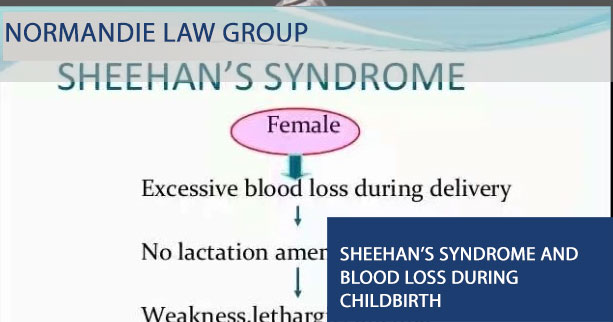Did you lose a dangerous amount of blood during childbirth or after childbirth? If so, you might have developed Sheehan’s Syndrome. Did you know that the development of Sheehan’s Syndrome could have been prevented with the appropriate care in response to your blood loss? Did you know that the complications you suffered as a result of Sheehan’s Syndrome could have been prevented if you would have been diagnosed and treated effectively? If you suffered Sheehan’s Syndrome, you might have grounds to file a medical malpractice claim against the medical professionals that failed to provide you with the care that you needed.
Are you interested in learning more about the possibility of pursuing a medical malpractice claim for your Sheehan’s Syndrome? If so, do not hesitate to contact the experts at Normandie Law Firm. Normandie Law Firm is a personal injury law firm with many years of experience handling a variety of claims, including medical malpractice claims. We have a thorough understanding of the different ways in which the lives of women and their families could be severely affected. We are dedicated to aggressively fighting for the rights of victims to ensure that all liable parties or entities are held accountable for the harm suffered. If you would like to discuss your claim with our experts, do not hesitate to contact our law firm immediately to speak with our Sheehan’s Syndrome medical malpractice lawyers.
About Sheehan’s Syndrome
 Sheehan’s Syndrome is a condition with many names: SS, postpartum hypopituitarism, postpartum pituitary necrosis, postpartum panhypopituitarism, and postpartum panhypopituitary syndrome, for example.Sheehan’s Syndrome occurs when women lose an excessive amount of blood during or after childbirth. The blood loss reduces blood flow to the pituitary gland, resulting in damage or necrosis (of the pituitary cells). In the case of damage or necrosis of the pituitary gland, production of important hormones is significantly reduced.
Sheehan’s Syndrome is a condition with many names: SS, postpartum hypopituitarism, postpartum pituitary necrosis, postpartum panhypopituitarism, and postpartum panhypopituitary syndrome, for example.Sheehan’s Syndrome occurs when women lose an excessive amount of blood during or after childbirth. The blood loss reduces blood flow to the pituitary gland, resulting in damage or necrosis (of the pituitary cells). In the case of damage or necrosis of the pituitary gland, production of important hormones is significantly reduced.
There are two types of Sheehan’s Syndrome – chronic Sheehan’s Syndrome and acute Sheehan’s Syndrome. In chronic Sheehan’s Syndrome, the damage to the pituitary gland is minimal, resulting in delayed symptoms (it can be years before a woman with chronic Sheehan’s Syndrome experiences symptoms). In acute Sheehan’s Syndrome, symptoms usually start immediately after childbirth since most of the pituitary gland is severely damaged (usually leaving less than 10% or normal, healthy tissue). When compared to its counterpart, acute Sheehan’s Syndrome can be very dangerous.
The hormones directly affected by Sheehan’s Syndrome include the following:
- TSH – thyroid-stimulating hormone – which stimulates the thyroid gland for the production of the hormones required to regulate the metabolism
- Prolactin which regulates the development of breasts as well as milk production
- LH – luteinizing hormone – which regulates estrogen
- GH – growth hormone – which controls the growth of bone and tissue and also balances fat and muscle tissue
- ACTH – adrenocorticotrophic hormone – which stimulates the adrenal glands for production of cortisol (allows the body to deal with stress) and other hormones necessary for normal body functions
There are a number of symptoms that women could experience as a result of Sheehan’s Syndrome. These symptoms include the following: irregular thirst/intake of water as well as high urine production (diabetes insipidus); decreased mental function, inability/difficulty to stay warm, weight gain (hypothyroidism); missing or irregular menstruation (amenorrhea or oligomenorrhea); low blood sugar (hypoglycemia); low blood pressure (hypotension); irregular heartbeat (tachycardia); the inability to respond to stress; the inability to re-grow previously removed pubic hair; fatigue; fainting; dry skin; issues with breast feeding; shrinking breasts; constipation. Unfortunately, many of these symptoms are considered normal during and after childbirth; this makes it even more likely for doctors to disregard women and paves the way for Sheehan’s Syndrome worsening.
In general, Sheehan’s Syndrome is not life-threatening; however, there is an exception. Sheehan’s Syndrome could lead to an adrenal crisis, in which the adrenal glands fail to produce cortisol. During an adrenal crisis, women can suffer low blood pressure, confusion, dehydration, unconsciousness, dizziness, fatigue, loss of appetite, weakness, fever, nausea, vomiting, fast heart rate, fast respiratory rate, and excessive seating, for example. An adrenal crisis could result in shock and could result in coma. In severe cases, an adrenal crisis could be fatal.
Sheehan’s Syndrome and Medical Malpractice – Is there a Correlation?
Can Sheehan’s Syndrome be considered medical malpractice? It is possible for women to develop Sheehan’s Syndrome as a direct result of medical malpractice. It is important to understand why Sheehan’s Syndrome can be caused by malpractice.
Consider the following points:
- Sheehan’s Syndrome is associated with extreme blood loss during or after childbirth – blood loss that could have been immediately addressed (by medical professionals) to prevent further harm.
- Extreme blood loss during or after childbirth requires strict follow-up care and medical attention to address any other possible symptoms or complications.
- A prompt diagnosis of Sheehan’s Syndrome along with the administration of the appropriate treatment can effectively control the condition without any major issues.
With the appropriate medical care, Sheehan’s Syndrome can be completely avoided. After developing Sheehan’s Syndrome, the appropriate care can prevent the syndrome to get out of control and affect multiple aspects of a woman’s life.
So, why can Sheehan’s Syndrome be considered medical malpractice? Sheehan’s Syndrome can be directly associated with a breached duty of care. More specifically, all medical professionals owe their patients a duty of care. They have the duty to exercise care, diligence, and skill when treating their patients. Essentially, they must do everything within their reach to ensure that their patients receive the appropriate care to remain or regain their health.
Every time that medical professionals fail to provide patients with the care necessary to diagnose or treat Sheehan’s Syndrome or another condition, they are being negligent. For example, when medical professionals fail to listen to their patients’ concerns, to run basic blood tests, to run imaging tests, or to monitor symptoms, medical professionals could be found negligent.
Any time that the negligence of a medical professionals results in harm – such as the development or worsening of a condition – the medical professionals could be found liable of medical malpractice. For more information about medical malpractice, do not hesitate to contact our law firm immediately.
Can You Pursue a Claim?
Can women who suffer Sheehan’s syndrome pursue a claim? Could women sue their doctors? Could women sue hospitals? Women might have grounds to pursue lawsuits for their Sheehan’s Syndrome if their condition was a direct result of the negligent actions of doctors or other medical professionals. During childbirth (and after childbirth), medical professionals must provide women with the appropriate care necessary for a recovery. In fact, medical professionals have a duty of care to use skill and diligence to ensure that their patients receive the diagnosis and treatment necessary to better their health. By failing to address a health issue and generally failing to exercise the level of care towards their patients, they are being negligent and putting patients at severe risk of suffering harm.
So, could you pursue a claim? Do you have the right to sue? If your development of Sheehan’s Syndrome has a direct result of the negligent actions of a doctor or entire medical staff, you might have grounds to pursue a claim and hold the liable parties accountable for their negligence and the harm that you suffered. If you would like to learn more about your right to pursue a claim after you developed Sheehan’s Syndrome as a direct result of the negligence of a doctor or medical team, do not hesitate to contact our law firm immediately.
Taking Action after Hemorrhaging and Feeling Unwell
Many women put their health on hold after becoming mothers. Unfortunately, follow-up appointments after childbirth usually focus on the wellbeing of the infant – resulting in mothers’ wellbeing being secondary. New mothers are often disregarded by medical professionals, and their ailments are brushed off as normal. Without a doubt, childbirth puts a lot of stress on a woman’s body and requires a significant recovery time. In general, women feel recovered anywhere from six to eight weeks after childbirth.
You know your body better than anyone else. If you still feel unwell even six to eight weeks after childbirth (or even longer), you should take action. Consider the following recommendations:
- Go to your doctor for a medical evaluation.
- If you are unsatisfied with your doctor’s conclusion, do not hesitate to seek other opinions until a doctor takes you and your symptoms seriously.
- Record all the symptoms that you are experiencing.
- Record all doctor visits, treatments, and effects of treatments on your symptoms.
- Record any diagnoses you receive (even those that are incorrect).
- Do not rest until you are correctly diagnosed, and you are on an effective treatment.
- Seek legal assistance from a medical malpractice attorney immediately.
There are various instances in which medical malpractice could occur. This includes the following: the failure to address the hemorrhaging; the failure to follow-up after hemorrhaging; the failure to diagnose Sheehan’s syndrome; misdiagnosis; wrong treatment. Regardless of the exact moment that the malpractice occurred resulting in the development or worsening of your condition, you must take action and hold the liable parties accountable for the harm that you suffered.
Understanding the Statute of Limitations – How Long Do You Have to Sue?
Without a doubt, you have the right to pursue a claim – but you could actually lose your right to file a claim if you fail to take action promptly. All claims are subject to a statue of limitations that determines the length of time that claimants have to file. The purpose of these deadlines is to ensure that claims are filed promptly (so that defendants do not have to unfairly face delayed claims since they might not have access to disproving evidence). If claimants do not file their claims within the time allowed by the applicable statute of limitations, they will lose their right to sue.
What is the statute of limitations that applies to your Sheehan’s Syndrome medical malpractice claim? There are two different deadlines that are relevant to medical malpractice claims based on California law. In California, one of the following deadlines could apply to medical malpractice claims:
- One year (after discovery)
- Three years (after injury)
Which deadline applies to your claim? The deadline that comes first is the deadline that applies to your claim. You can file either one year after discovery of your diagnosis or three years after the initial harm that resulted in the diagnosis. Because you could lose your right to sue if you fail to file your claim within the time allowed by the relevant deadline, it is of utmost importance do speak to an attorney to ensure that you are aware of the timelines to which you must adhere. It is also important to note that exceptions might apply (resulting in tolled deadlines); an experienced lawyer will be able to give you all the information that you need to ensure that you understand the deadlines to which your claim is subjected.
Could You Recover Compensation?
If you developed Sheehan’s Syndrome after hemorrhaging during or after childbirth, you might be eligible to receive compensation for the harm that you suffered and will likely continue to suffer. Depending on the specific details of your Sheehan’s Syndrome claim, you could recover compensation for at least some of the following:
- Medical costs
- Lost wages
- Pain and suffering
- Loss of consortium
- Funeral and burial costs
- Punitive damages
Some of the compensation listed above, specifically compensation for the loss of consortium and funeral/burial costs, are usually reserved for claims filed by the family of deceased victims. The specific type and amount of compensation that you are eligible to recover will be based on the specific details of your claim. If you are ready to fight for your right to recover compensation, you should contact our firm today. At Normandie Law Firm, we understand that monetary compensation cannot undo the harm that you suffered as a direct result of medical malpractice. Rather, we believe that compensation can help start moving forward from such a traumatic time in your life. If you are ready to fight for your right to recover the maximum amount of compensation available for your Sheehan’s Syndrome medical malpractice claim, do not hesitate to contact our lawyers today.
Normandie Law Firm Can Help You
If you developed Sheehan’s Syndrome after you lost an excessive amount of blood during or after childbirth, you might have grounds to pursue a medical malpractice claim. If you are considering the possibility of pursuing a Sheehan’s Syndrome medical malpractice claim, it is essential that you seek legal assistance immediately with the experts at Normandie Law Firm. Normandie Law Firm is a personal injury law firm with many years of experience handling a variety of claims and fighting for the rights of all affected parties – until they are rightfully compensated. If you are interested in pursuing a claim after medical professionals failed you and contributed to your development of Sheehan’s Syndrome, do not hesitate to contact us for more information regarding your rights.
At Normandie Law Firm, we are dedicated to ensuring that all affected parties have access to the legal services necessary to get all the information relevant to pursuing their claims. We also are aware that many affected parties never seek legal assistance because they fear the financial strain that filing a claim could create. To ensure that a fear of legal fees never gets in the way of getting the assistance necessary to file a claim, our firm offers free legal services which include free consultations and free second opinions. During our free consultations and free second opinions, our lawyers will be available to answer all your questions and address all your concerns related to your claim. To benefit from our free legal services, do not hesitate to contact our firm immediately – we want to help you file a claim and fight for your right to be compensated.
How can we provide free legal services? Our free legal services are available as part of a Zero-Fee guarantee that ensures that our clients are never required to pay any upfront legal fees. Our firm is also based on a contingency structure that makes it so clients never have to pay anything until after reaching a positive outcome and recovering compensation. At Normandie Law Firm, we try to make it as easy as possible for victims to take legal action and fight for their rights. We are committed to guiding you every step of the way and ensuring that you reach a successful claim outcome. If you are ready to discuss your Sheehan’s Syndrome medical malpractice claim with our attorneys, contact us today.











